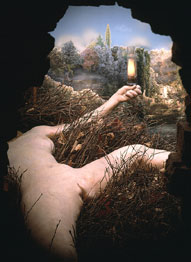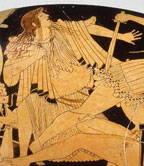click to enlarge


Left
Marcel Duchamp,Exterior view of Etant donnés: 1° la
chute d’eau / 2° le gaz d’éclairage(Given: 1. The Waterfall /
2. The Illuminating Gas), 1946-1966 © 2000 Succession Marcel
Duchamp ARS, N.Y./ADAGP, Paris.
Right
Marcel Duchamp, Interior view of Etant donnés: 1° la
chute d’eau / 2° le gaz d’éclairage (Given: 1. The Waterfall /
2. The Illuminating Gas),1946-1966 © 2000 Succession Marcel Duchamp
ARS, N.Y./ADAGP, Paris.
In the spring of 1961,Euripides’s The Women of Troy opened at the Récamier Theater in Paris. The first night was attended by many of the intellectual elite: André Pierye de Mandiargue, Alain Jouffroy, Robbe-Grillet and Octavio Paz; our party was made up of Noma and Bill Copley, Marcel Duchamp and myself. The Women of Troy, being both anti-war and anti-misogynist, has been produced more times than any other Greek play so that Marcel might have seen it before, though he did not say so. The play was given an extravagant production in New York in 1964, so he might have seen it again at the very time he was changing the name of the foundation that was to donate his yet secret work [Given: 1. The Waterfall, 2. The Illuminating Gas] to the Philadelphia Museum of Art.
click to enlarge

Attributed to the Brygos
Painter Vase,
ca. 480
B.C. – 475 B.C.
© Museé du Louvre
Euripides opens his play with Cassandra, possessed with prophecy, coming on stage with a flaming torch in each hand. One she places in a sconce on the statue of Hymen, God of Marriage, and the other she holds high in her right hand singing the marriage song, prophesying her betrothal to Agamemnon; this despite the fact that even Apollo had respected her virginity.
“Hecabe,”says Hephaestus. “In our weddings you are the torch-bearer; but this torch-bearing is a hideous mockery.”
At dinner after the play the four of us discussed the predicament in which Cassandra had put Apollo. Apollo appeared to her and promised to teach her the art of prophecy if she would lie with him. After accepting his instruction, Cassandra went back on the bargain. A successful teacher communicates the facility of achieving certain significant results which become intuitive once acquired by the student. So it was with Cassandra, and she saw no reason to lose her virginity for something that was already hers. (This is heuristic education and can at times be disconcerting.) Apollo, accepting the fact that what he taught her was irretrievably hers, begged her to give him just one kiss. A sentimental compliance to what seemed to be an innocent reward was her demise. As she gave Apollo his kiss, he spat into her mouth thus ensuring that none would ever believe what she prophesied.What he did in spite was not instruction but a God-given gift.
Not long after this I made a sculpture called The Torch of Cassandra which was bought by Barnet Hodes, one of the directors, along with Marcel Duchamp and Noma and William Copley, of the William and Noma Copley Foundation. Some years later, Hodes told me that because of my sculpture he had investigated the story of Cassandra, so that when Marcel presented the motion to change the name of the foundation to the Cassandra Foundation, he (Hodes) said, he was the only one to know her story.
Bill Copley recounted an incident that happened in his sixty-ninth street apartment in New York.Noma did not, naturally enough, see why the Noma and William Copley Foundation should be changed to the Cassandra Foundation. Marcel was waiting in the living room while Bill was in the bedroom, which was just off the living room, trying to convince Noma to change the name of the Foundation. After quite a time, Bill blew a cloud of white cigarette smoke out the door of the bedroom to let Marcel know that he had been successful.
I see a relation between Marcel Mauss’s “Essai sur le don,” “Étant donnés,” “don de la Fondation Cassandra,” the gift of Cassandra (which Marcel seemed to think was among his gifts as well) and all that potlatch entails. Marcel spent the war in the German-speaking part of Switzerland and had lived in Germany and so was able to add a common Teutonic word to his arsenal of puns, “Gift”: die Gift, gift, das Gift, poison.
(In a telephone conversation, March 1, 2000, Noma Copley would not comment on Mr. Metcalf’s remarks. However she assured us that “his statements are all fine.”)



